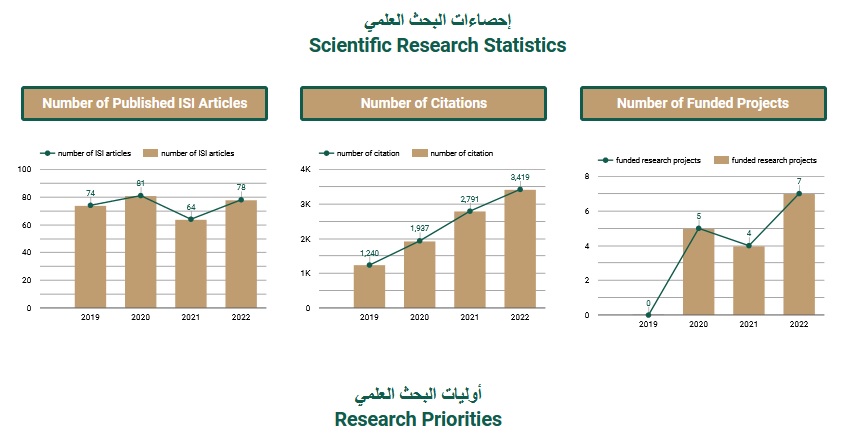Scientific Research

Research Priority # 1: Civil and Environmental Engineering
The growing economy and increasing population in KSA has necessitated the need for sustainable design, construction and maintenance of manmade infrastructure such as dams, bridges, housing etc. Supply of renewable energy and clean water to maintain this infrastructure is becoming ever more important. In this context, Dept. of civil engineering has identified key areas to be addressed through application of scientific research and as a means to provide valuable solutions to sustainable construction and renewable water resources and energy supply. Each area will be addressed in a specific activity provided in subsequent sections.
Associated Activities
Activity #1: Prediction and Mitigation of Flood in The Kingdom of Saudi Arabia.
Activity #2: Management of renewable and non-renewable water resources for sustainable use in Saudi Arabia.
Activity #3: Renewable Energy From biomass waste
Activity #4: The possibility of using heavy fuel in the manufacture of sustainable aerated concrete.
Activity #5: Sustainable solutions for fire-resistant construction using waste tires in Saudi Arabia.
Research Priority # 2: Electrical engineering, electronic engineering, communication engineering
In KSA, there is an impressive natural potential for solar and wind power, and local energy consumption will increase threefold by 2030, we still lack a competitive renewable energy sector at present. To build up the sector, the 2030 vision set an initial target of generating 9.5 gigawatts of renewable energy. Along with this, a sophisticated digital infrastructure is integral to today’s advanced industrial activities. It attracts investors and enhances the fundamental competitiveness of the Saudi economy. We will partner with the private sector to develop the telecommunications and information technology infrastructure, especially high-speed broadband, expanding its coverage and capacity within and around cities and improving its quality. The 2030 vision goal is to exceed 90 % housing coverage in densely populated cities and 66 percent in other urban zones. We will also develop building standards to facilitate the extension of broadband networks.
Associated Activities
Activity #1: Designing of Antennas and Microwave Systems.
Activity # 2: Using passive Photonic devices in energy harvesting systems.
Activity # 3: Implementation of wireless sensor Communication networks.
Activity # 4: New trends in Digital signal processing and algorithms.
Activity # 5: Enhancing the optical networks.
Activity # 6: New trends in renewable energy systems.
Activity # 7: Improving the electric power system.
Activity # 8: New trends in high voltage engineering.
Research Priority # 3: Mechanical Engineering
In KSA, demand for energy and sustainability will increase threefold by 2030. With this background, there is a need to focus on various research areas such as renewable energy, water treatment, materials for sustainability, railway engineering etc. Outcomes from the research on above areas will lead to applications in the field of solar energy devices, transportation engineering and sustainable materials, which will help the Kingdom achieve its Vision 2030 objectives, including raising the competitiveness of renewable energy and reducing carbon emissions. In this context, Dept. of Mechanical engineering has identified key areas to be addressed through application of scientific research and as a means to provide valuable solutions towards the Vision 2030. Each area will be addressed in a specific activity provided in subsequent sections.
Associated Activities
Activity # 1: Efficiency enhancement of Solar collectors.
Activity # 2: Cooling of Solar PV panels.
Activity # 3: Production of metal matrix composites for transportation and energy industries.
Activity # 4: Joining of materials for sustainable applications.
Activity # 5: Manufacturing of materials for sustainability.
Activity # 6: Improving the quality and efficiency of railway.
Activity # 7: Materials science and sustainable and renewable energy applications.
Activity # 8: Membranes and nanomaterials for water treatments.
